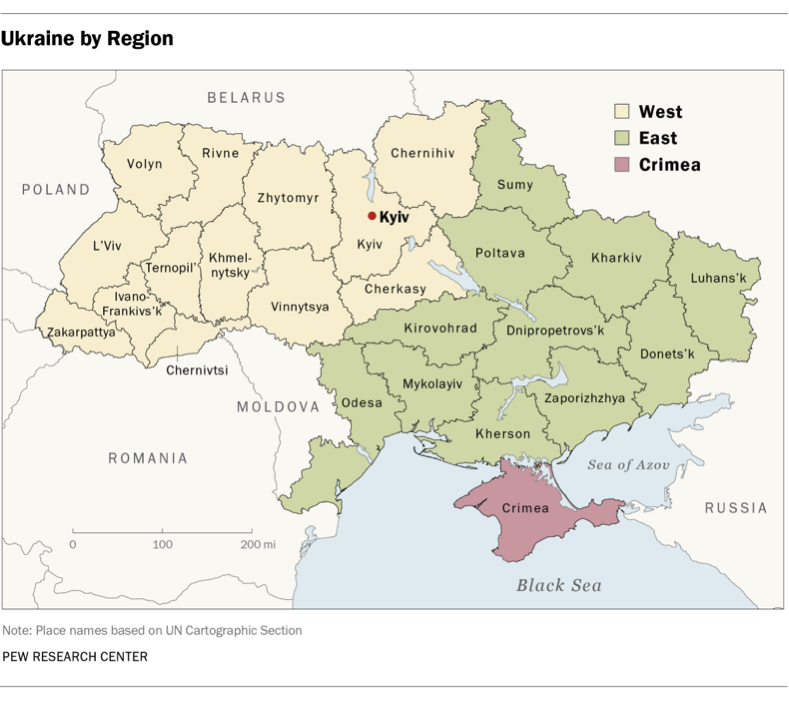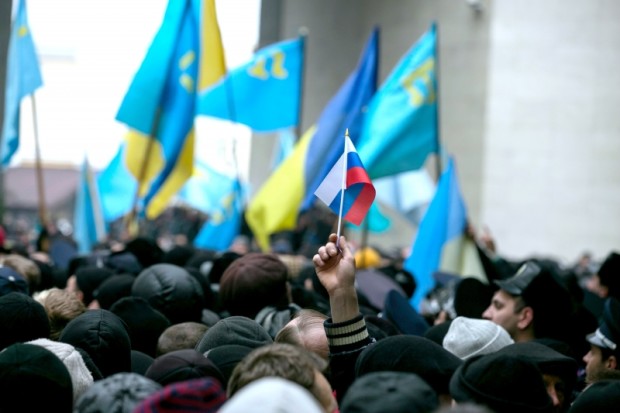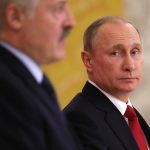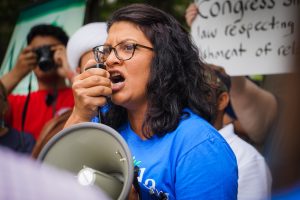by Derek Davison
The Pew Research Center has conducted public opinion surveys in Ukraine (April 5-23) and Russia (April 4-20), and the results, released May 8, shed some light on the ongoing conflict between the two countries. They reveal a Ukraine that is more unified than recent events would suggest, and they illuminate the domestic politics driving Russian President Vladimir Putin’s actions. At the same time, the results may offer a way for the interim government in Kiev to defuse some of the separatist tensions that have gripped cities in eastern Ukraine.
The Ukrainian results were broken down by region, with the country divided into “West,” “East,” and “Crimea” per the map below:

The headline result of Pew’s Ukrainian survey is that a large majority of Ukrainians (77%) want the country to remain united. This isn’t terribly surprising, but what is interesting is the large majority in favor of union in the eastern part of the country (70%), where Russian separatism is at its highest. Even among Russian speakers in the eastern part of Ukraine, a solid majority (58%) want to see Ukraine stay whole. In Crimea, which has already voted in favor of secession, it is no surprise that a majority (54%) of those surveyed support allowing parts of Ukraine to secede.
So despite the recent unrest caused by pro-Russian militias in eastern Ukrainian cities like Donetsk, Luhansk, and Slovyansk, only a small minority of Ukrainians in that part of the country want the right to secede — 18% overall, and only 27% of Russian speakers. However, the survey also points to the challenges facing Kiev as it attempts to bring the region back under control. Two-thirds (67%) of Ukrainians in the east say that the government in Kiev has had a “bad influence” on the current situation, compared to only 28% in the west, and 66% in the east say that the Kiev government does not respect “personal freedoms.” Some sign of competent, stable leadership from Kiev could go a long way toward easing the concerns of eastern Ukrainians. Kiev could also take steps to try to ease ethnic tensions, which 73% of Ukrainians (evenly distributed throughout the country) identify as a very or moderately big problem.
One way to ease those tensions could be by protecting regional languages other than Ukrainian; 54% of Ukrainians believe that Russian and Ukrainian should both be official languages (compared with 41% who believe that Ukrainian should be the only official language), with 73% in the east (86% of Russian speakers) supporting that idea but only 30% in the west. A compromise policy that allows regional governments to raise other languages to official status, while making Ukrainian the only official national language, could satisfy separatist concerns without raising significant apprehension in the west, and there are signs that the interim government is pursuing such a compromise. Steps must also be taken to curb the influence of neo-fascist organizations like Right Sector, which 65% of Ukrainians agree is having a negative impact on Ukrainian affairs.
It must be noted, however, that Pew’s survey was conducted before the most recent spate of violence in eastern Ukraine, in particular before last week’s clashes in Odessa in which dozens of pro-Russian sympathizers were killed by pro-Ukrainian protesters. Kiev must take steps to prevent additional violence, which will only further alienate eastern Ukrainians and reduce the chances for reconciliation.
The Ukrainian survey also points out the damage that Russia’s reputation has suffered in Ukraine. When asked about the impact that Russia is having on Ukrainian affairs, 67% say “bad” versus 22% who say “good.” Compare that figure to the results for the European Union (45% good, 33% bad) and the United States (tied at 38%) and it is clear how much Ukrainians as a whole have soured on their Russian neighbors. Even in the supposedly pro-Russian east, 58% of those surveyed (and a plurality of 44% of Russian speakers) agreed that Russia was having a “bad” impact on Ukrainian affairs.
In contrast, Pew’s survey of Russian citizens reveals a populace that is firmly behind President Vladimir Putin’s actions with respect to Ukraine and believes Russian expansion, as in the case of Crimea, is justified. When asked if “there are parts of neighboring countries that really belong to Russia,” 61% of Russians surveyed either completely or mostly agree with that sentiment, compared to only 28% who mostly or completely disagree. The percentage of Russians who are confident in Putin’s ability to handle international affairs is higher (83%) than it has been at any time in the past six years (as far back as the report’s data goes). A plurality of Russians (43%) agree that “Putin’s handling of the situation in Ukraine has led people in other countries to have a more favorable opinion of Russia,” and 55% agree with the statement: “It is a great misfortune that the Soviet Union no longer exists,” though that percentage has been relatively consistent since Pew began asking that question five years ago.
Pew’s findings illustrate that domestic Russian politics are a key driver behind Putin’s actions with respect to Crimea and eastern Ukraine, though the sharp decline in Russia’s prestige in Ukraine may help to explain why Putin seems to have adopted a more conciliatory tone in recent days.
Putin has very little to lose domestically, and much to gain, by adopting a more energetic stance with regards to the internal politics of Russia’s neighbors. At the same time, Pew’s Ukrainian survey strongly suggests that there is an opening for the government in Kiev, perhaps under the influence of its EU and US allies, to take steps — preventing further violence, protecting minority languages, and eliminating the pernicious influence of far-right groups — that will ease the concerns of eastern Ukrainians, who at this point remain largely opposed to any secession effort.






Polls, the questions asked, and what do they really show? Pew doing the polling, but it was done before the “bloodshed” of the past week. I wonder, just how large a percentage of the Ukrainians, especially the western inhabitants, will still support the Kiev putsch when the IMF austerity kicks in? And who is the favorite to win an election, an “oligarch” chocolate billionaire. And just how are they going to deal with the Nazi-right wing thugs, buy them off too? Considering that the possibility, of closing down the manufacturing industry in the eastern part of Ukraine, could result in those skilled workers going to work in Russia. Then what, the Kiev government pulls a “Marie Antoinette” redo of the starving masses with “let them eat chocolate”?
Most protestors in the east want more autonomy, not to separate totally from Ukraine.